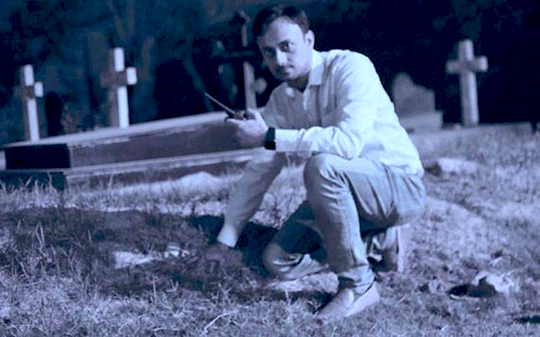New Delhi, Jul 12: Indian paranormal investigator Gaurav Tiwari, 32, was found dead at his Dwarka home, under curiously mysterious circumstances. Police are calling it a case of asphyxiation, but are yet to ascertain if it was a suicide.

The founder and CEO of the Indian Paranormal Society was found lying on his bathroom floor with a thin black line across his neck.
According to his family, they heard a loud thud from his bathroom at around 11 am on Thursday. They forced their way through the locked door to find Tiwari lying on the floor. He was rushed to a hospital but could not be resuscitated.
Suicide or not?
Initial investigation shows Tiwari had no financial or other pressing issues that could have driven him to suicide. He was featured on this month's cover of Youth Incorporated magazine and even posted about a day before his death.
Recently married, Tiwari used to stay out ghost-hunting quite late into the night and it led to some marital friction. He was investigating a suspected haunted house in Delhi's Janakpuri on Wednesday and returned home at around 1:30 am at night. He appeared absolutely fine on the day of his death and was "checking mails" a few minutes before he died.
Police searched the house and Tiwari's mobile for clues but couldn't find anything substantial. They are now waiting for the full autopsy report.
His family members - who don't believe in the paranormal - initially suspected he died from a the trauma from falling on the bathroom floor, a possibility that's being inspected. They have maintained that Tiwari had no reasons to kill himself. Meanwhile, Australian paranormal investigator Allen Tiller who was working with Tiwari on a Syfy TV series 'Haunting: Australia' told his fans on Facebook that Tiwari had a heart attack.
There are, however, deeper mysteries behind his death.
Tiwari's father told the Times of India that his son was feeling "a negative force was pulling him towards it." He told his wife about it a month ago, saying "he was trying to control it but seemed unable to do so." His wife dismissed his fears believing he was just depressed with the workload and didn't tell the family about it.
A spooky life
An ordained minister or Metaphysical Church of Humanistic Science, 'Reverend' Gaurav Tiwari was a certified paranormal investigator and UFO field investigator. During the course of his work, he visited more than 6,000 'haunted locations' and investigated 'hauntings', 'UFO abductions' and 'mysterious creatures'.
His paranormal research skills were so strong that his team was completely dependent on him despite having access to many hi-tech equipment like full-spectrum cameras.
In India, Tiwari had worked on various TV shows including Haunted Weekends with Sunny Leone, Bhoot Aaya, MTV He Ticket and Fear Files. He also appeared in Bollywood flicks 16 December and Tango Charlie.
Tiwari's tryst with the paranormal began in 2007 while he was studying in Florida, USA to become a commercial pilot. He experienced phenomena like poltergeists and heard disembodied 'whispers' in the apartment he was sharing with four other people. One of his flatmates also saw an apparition of young girl.
Soon after, all housemates reported hearing footsteps from the attic and seeing a translucent apparition of a young girl. The group vacated the house as they struggled to explain the goings-on, but the paranormal had already seized Tiwari's imagination.





Comments
Add new comment